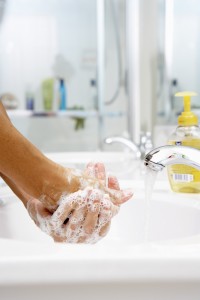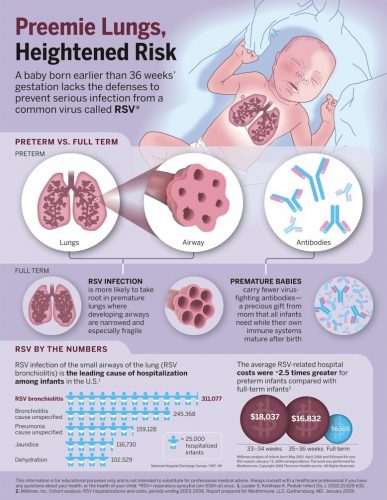Newborns are so precious that I think you can never be too careful, especially when it comes to germs. While I did get lax as I had more children (I am at three now) the one thing I have always been adamant about is constant handwashing and staying away if your sick. You would think people would know better but it is amazing how many of my own friends and relatives wanted to hold my baby girl without washing their hands or if they were just a little sick – to a baby there is no ‘little sick.’ Young infants are very susceptible to infection (especially in their early weeks) so even a common cold could be very dangerous to them. Babies who are born early may have underdeveloped lungs and immature immune systems so you have to be extra careful around them.
RSV, Respiratory Syncytial Virus, is a virus that while common it spreads easily and can lead to a serious respiratory infection. The virus can live on surfaces (like doorknobs, countertops, toys, bedding) for several hours and is often spread through touching,  hugging, and kissing. RSV is so common that nearly 100% of children have had RSV by their second birthday, symptoms being similar to a cold or flu.
hugging, and kissing. RSV is so common that nearly 100% of children have had RSV by their second birthday, symptoms being similar to a cold or flu.
Tips to remember when around a new baby:
- Stay away if you have been recently sick, exposed to an illness or feel like you may be getting sick
- Wash your hands frequently, especially first thing prior to holding the baby
- Leave toddlers at home, especially during winter months. Young children often carry germs and viruses, like RSV that easily spread.
Some final facts about RSV to think about:
- Serious RSV infection is the leading cause of infant hospitalization, responsible for more than 125,000 hospitalizations and up to 500 infant deaths per year.
- RSV occurs in epidemics each fall through spring
- There is no treatment for RSV
- Certain babies are at an increased risk for developing an RSV infection
- Symptoms of serious RSV include: persistent coughing or wheezing; rapid, difficult, or gasping breaths; blue color on the lips, mouth, or under the fingernails; high fever; extreme fatigue; and difficulty feeding. Parents should contact a medical professional immediately upon signs of these symptoms.
VISIT: To learn more about RSV, visit www.rsvprotection.com.
Mom and More Disclosure: I wrote this review while participating in a blog tour by Mom Central Consulting on behalf of MedImmune and received promotional item to thank me for taking the time to participate. Please see my Disclosure Policy.







